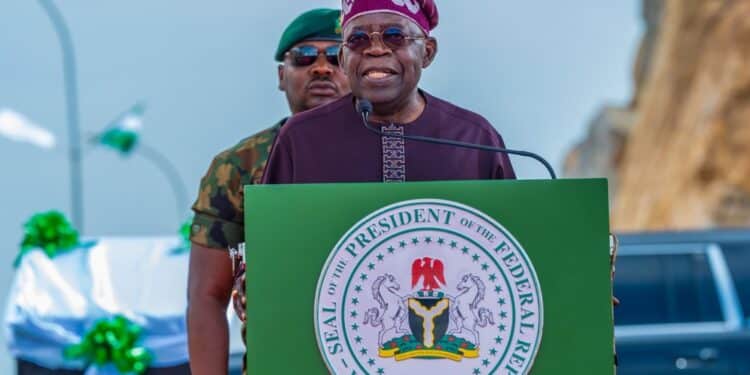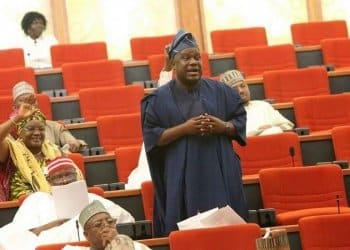Five institutions in Nigeria have been named after President Bola Tinubu since he assumed office in May 2023. The latest was a newly constructed army barracks in Asokoro, Abuja, with a wave of criticism trailing it.
The Bola Ahmed Tinubu Barracks, inaugurated on January 23, 2025, follows the federal government’s approval to establish Bola Ahmed Tinubu Polytechnic, Gwarinpa, also in Abuja, to promote technological, vocational, and entrepreneurial education.
According to DailyTrust, the trend began 11 months ago when the Niger State Government in March 2024 renamed the Abubakar Imam International Airport in Minna as Bola Ahmed Tinubu International Airport, sparking outrage, particularly among residents of Rafi Local Government Area, the home of the late Abubakar Imam Kagara. The renaming was controversial as the airport had only been named after Abubakar Imam in June 2023 in recognition of his contributions to northern Nigeria’s literary, political and educational landscape.
Similarly, in May 2024, the National Assembly Library and Resource Centre was inaugurated and named the Bola Tinubu Building, while in December 2024, the Nigeria Immigration Service named its state-of-the-art technology complex after President Tinubu, citing his commitment to innovation.
Beyond these five institutions, there is also a proposed Bola Ahmed Tinubu Federal University of Nigerian Languages in Aba, Abia State. A bill for its establishment was introduced in the House of Representatives in October 2024 to advance higher education in Nigerian languages and cultures.
Weekend Trust reports that despite not breaching any known law, the trend of naming institutions after a sitting president has raised moral and ethical concerns. The controversy around these renaming exercises intensifies, particularly due to the perception that they are politically motivated.
A moral issue, not legal
While it is not uncommon for governments worldwide to name institutions after past leaders or significant figures, critics have raised concerns about naming critical institutions after sitting presidents. In particular, the growing trend of naming various public facilities after President Tinubu has been met with widespread disapproval. Many argue that this practice reflects a troubling pattern of self-promotion and is not in line with democratic principles.
Seun Onigbinde, co-founder of BudgIT, a civil society organisation dedicated to promoting transparency and accountability in Nigeria, expressed his concerns on X (formerly Twitter).
He wrote, “In less than a year, four public institutions have been named after President Bola Tinubu. This abuse of norms is rooted in the sycophantic culture that has grown in recent times. The president should put a stop to this as he is signaling a culture that is highly unacceptable.”
Onigbinde’s statement summed the criticism that this renaming trend represents a form of sycophantic excess, where institutions are manipulated for the benefit of those in power, rather than being named in recognition of true merit or service to the country. He contended that this practice diminished the significance of public institutions by associating them too closely with the personal image of the sitting president.
In support of Onigbinde’s criticism, another observer commented, “Nothing to worry about; once power changes hands, it will be returned to the initial name it was bearing,” even as another posited that “institutions and public infrastructures will begin to have name changes every 4/8 years with the cost burden on the public purse.”
Civil society groups respond
Several prominent civil society groups have condemned the practice, arguing that it undermines democratic values and fosters an unhealthy culture of personality worship.
Dr Moses Paul, convener of the Free Nigeria Movement, a coalition of activist groups, expressed his dismay at the administration’s direction. He stated that naming significant public institutions after a sitting president compromises national integrity and undermines democracy.
He described the renaming of a military barracks in Asokoro after Tinubu as particularly egregious.
“Military barracks are not mere structures; they are sanctuaries of sacrifice, discipline, and service to the nation. Naming one after a sitting president while countless soldiers have paid the ultimate price for our security dishonours their memory,” he said.
Paul argued that public infrastructures worldwide bear the names of individuals whose contributions have endured over time. “Nigeria’s military has suffered immense losses in the fight against insurgency. Naming barracks after fallen soldiers would be a far more fitting tribute,” he added.
He warned that such actions erode public trust in governance, signalling a lack of accountability and a tendency toward self-glorification.
“We call on the federal government to review these decisions. Nigeria deserves a leadership that respects its history, honours its heroes and prioritises its people over self-aggrandisement. True leadership is measured not by names on buildings but by lasting impact on citizens’ lives,” he said.
Comrade Ibrahim Zikirullahi, the executive director of the Resource Centre for Human Rights and Civic Education (CHRICED), also condemned the renaming of institutions, arguing that such actions are part of a broader strategy to consolidate political power rather than honouring individuals who have made lasting contributions to society.
“Naming government institutions after public figures is not alien to Nigeria, but the manner in which the current administration is naming almost every government institution after President Tinubu is disturbing. The standard practice is for successors to honour a leader after they leave office. Naming institutions after a sitting president not only undermines historical continuity but risks politicising public resources,” he said.










